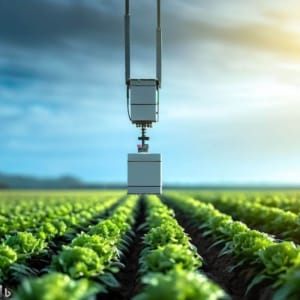Nitrate Ions
An Essential Component of Soil Fertility and Agriculture
Nitrate ions are a crucial component of soil fertility and agriculture, playing a vital role in plant growth and development. These ions are a form of nitrogen that plants use to produce proteins, enzymes, and other essential molecules. Without enough nitrate in the soil, plants can’t grow to their full potential, leading to lower crop yields and reduced agricultural output. As a result, farmers and agricultural specialists often rely on fertilizers to supplement the natural levels of nitrate in the soil, ensuring that their crops have access to the nutrients they need to thrive. In this article, we’ll explore the importance of nitrate ions in agriculture, including how they contribute to soil fertility, how farmers can optimize their use, and the potential environmental impacts of excessive nitrate use. Whether you’re a seasoned agricultural professional or just curious about the science behind plant growth, there’s plenty to learn about this essential component of modern farming practices.
The Role of Nitrate Ions in Agriculture
Nitrate ions are a crucial component of plant growth and development, playing a vital role in the nitrogen cycle. Nitrogen is one of the essential nutrients that plants require for growth, and nitrate is a form of nitrogen that plants can use to produce proteins, enzymes, and other essential molecules. Nitrate is also the most common form of nitrogen found in the soil, making it an essential component of soil fertility. Nitrate ions are taken up by plant roots and transported to the leaves, where they are used to produce chlorophyll, the molecule responsible for photosynthesis.
In addition to its role in plant growth and development, nitrate ions also play a critical role in the nitrogen cycle. Nitrogen is a naturally occurring element that is found in the air, water, and soil. Nitrogen fixation is the process by which nitrogen is converted from its gaseous form in the atmosphere into a form that can be used by plants. Nitrogen fixation can occur naturally, through lightning strikes, or through the activity of nitrogen-fixing bacteria in the soil. Nitrate ions are a product of the nitrogen cycle, and they are produced when nitrogen is converted into a form that plants can use.
Nitrate ions are an integral component of soil fertility, and they play a critical role in maintaining the health and productivity of agricultural lands. By ensuring that crops have access to the nutrients they need to grow and thrive, farmers can maximize their yields and provide food for a growing population. However, managing nitrate ions in the soil can be challenging, and it requires careful attention to soil testing, fertilizer application, and crop management.
Nitrogen Cycle and Nitrate Ion Availability
The nitrogen cycle is a complex process that involves the conversion of nitrogen from its gaseous form in the atmosphere into a form that plants can use. Nitrogen fixation is the process by which nitrogen is converted from its gaseous form in the atmosphere into a form that can be used by plants. Nitrogen fixation can occur naturally, through lightning strikes, or through the activity of nitrogen-fixing bacteria in the soil. Once nitrogen is fixed, it can be converted into other forms, such as nitrate ions, through a process known as nitrification.
Nitrate ions are the most common form of nitrogen found in the soil, and they are an essential component of soil fertility. The availability of nitrate ions in the soil can vary depending on a variety of factors, including soil type, climate, and management practices. For example, sandy soils are more prone to leaching, which can result in lower levels of nitrate ions in the soil. In contrast, clay soils can retain nitrate ions more effectively, leading to higher levels of nitrate in the soil.
Nitrate availability can also be affected by management practices, such as crop rotation and fertilizer application. Crop rotation is a practice that involves planting different crops in the same field over time, which can help to maintain soil health and fertility. Fertilizer application is another critical factor in managing nitrate ions in the soil. Fertilizers can be used to supplement the natural levels of nitrate in the soil, ensuring that crops have access to the nutrients they need to grow and thrive.
 Nitrate Ion Testing and Soil Analysis
Nitrate Ion Testing and Soil Analysis
Soil testing is an essential tool for managing soil fertility and optimizing crop yields. Soil tests can be used to determine the nutrient content of the soil, including nitrate ions, and to identify potential nutrient deficiencies or excesses. Soil tests can also be used to determine the pH of the soil, which can affect the availability of nutrients to plants.
There are several different types of soil tests that can be used to measure nitrate levels in the soil. One common method is the nitrate test, which involves extracting nitrate from the soil and measuring its concentration using a colorimetric assay. Another method is the anion exchange membrane method, which involves using a membrane to extract nitrate ions from the soil and measuring their concentration using an ion-selective electrode.
Soil analysis is another critical tool for managing soil fertility and optimizing crop yields. Soil analysis involves analyzing the physical, chemical, and biological properties of the soil, including its nutrient content, texture, and organic matter content. By understanding the properties of the soil, farmers can make informed decisions about crop management practices, such as fertilizer application and irrigation.
Sources of Nitrate Ions Fertilizers
Fertilizers are an essential tool for managing nitrate ions in the soil and ensuring that crops have access to the nutrients they need to grow and thrive. There are several different types of fertilizers that can be used to supplement the natural levels of nitrate in the soil, including synthetic fertilizers and organic fertilizers.
Synthetic fertilizers are chemical compounds that are designed to provide specific nutrients to plants, including nitrogen, phosphorus, and potassium. Nitrogen fertilizers are the most commonly used type of synthetic fertilizer, and they can be further subdivided into two categories: ammoniacal and nitrate fertilizers. Ammoniacal fertilizers are composed of ammonium ions, while nitrate fertilizers are composed of nitrate ions.
Organic fertilizers are made from natural materials, such as animal manure, compost, and bone meal. Organic fertilizers can provide a slow-release source of nutrients to plants, and they can help to improve soil health and fertility over time.
 Nitrate Ion Management and Best Practices
Nitrate Ion Management and Best Practices
Managing nitrate ions in the soil requires careful attention to fertilizer application rates, crop management practices, and soil testing. Overuse of fertilizers can lead to excess nitrate levels in the soil, which can have negative environmental consequences, including groundwater contamination and eutrophication of waterways.
One best practice for managing nitrate ions in the soil is to use fertilizer management software, which can help farmers to optimize their fertilizer application rates and minimize the risk of excess nitrate contamination. Another best practice is to use precision agriculture techniques, such as variable rate fertilization, which can help to optimize nutrient use efficiency and reduce the risk of over-fertilization.
Crop management practices can also play a crucial role in managing nitrate ions in the soil. For example, crop rotation can help to reduce the risk of soil erosion and nutrient depletion, while conservation tillage practices can help to improve soil health and fertility.
 The Benefits of Nitrate Ion Fertilizers for Crops
The Benefits of Nitrate Ion Fertilizers for Crops
Nitrate ion fertilizers can provide several benefits to crops, including increased growth rates, higher yields, and improved quality. Nitrate ions are essential for plant growth and development, and providing crops with a reliable source of nitrate can help to ensure that they have access to the nutrients they need to thrive.
Nitrate ion fertilizers can also help to improve the quality of crops by increasing their protein content and improving their resistance to pests and diseases. In addition, nitrate ion fertilizers can help to increase crop yields, which is essential for meeting the growing demand for food worldwide.
Potential Risks and Concerns of Nitrate Ions
Excess nitrate levels in the soil can have negative environmental consequences, including groundwater contamination and eutrophication of waterways. Nitrate ions are highly soluble in water, and they can easily move through the soil and into groundwater supplies. High nitrate levels in drinking water can pose health risks, particularly for infants and pregnant women.
Excess nitrate levels in the soil can also contribute to the production of greenhouse gases, such as nitrous oxide, which can contribute to climate change. Nitrous oxide is a potent greenhouse gas, with a global warming potential that is 300 times greater than carbon dioxide.
Case Studies and Examples of Successful Nitrate Ion Use
There are many examples of successful nitrate ion use in agriculture, including the use of precision agriculture techniques and the development of new fertilizers that minimize the risk of environmental contamination. One example is the use of variable rate fertilization, which involves applying different amounts of fertilizer to different parts of a field based on soil conditions and crop requirements.
Another example is the use of slow-release fertilizers, which release nitrogen slowly over time, reducing the risk of excess nitrate in the soil. Slow-release fertilizers can also help to improve soil health and fertility over time, making them a more sustainable option for farmers.
 Future Outlook for Nitrate Ion Usage in Agriculture
Future Outlook for Nitrate Ion Usage in Agriculture
Nitrate ions are an essential component of soil fertility and agriculture, playing a vital role in plant growth and development. However, managing nitrate ions in the soil can be challenging, and it requires careful attention to soil testing, fertilizer application, and crop management.
The future outlook for nitrate ion usage in agriculture is promising, with new technologies and management practices emerging that can help to optimize nutrient use efficiency and reduce the risk of environmental contamination. By adopting these practices, farmers can ensure that their crops have access to the nutrients they need to thrive, while also protecting the environment and promoting sustainable agriculture practices.


 Need measure nitrate?
Need measure nitrate?
 Nitrate Ion Testing and Soil Analysis
Nitrate Ion Testing and Soil Analysis Nitrate Ion Management and Best Practices
Nitrate Ion Management and Best Practices Future Outlook for Nitrate Ion Usage in Agriculture
Future Outlook for Nitrate Ion Usage in Agriculture

